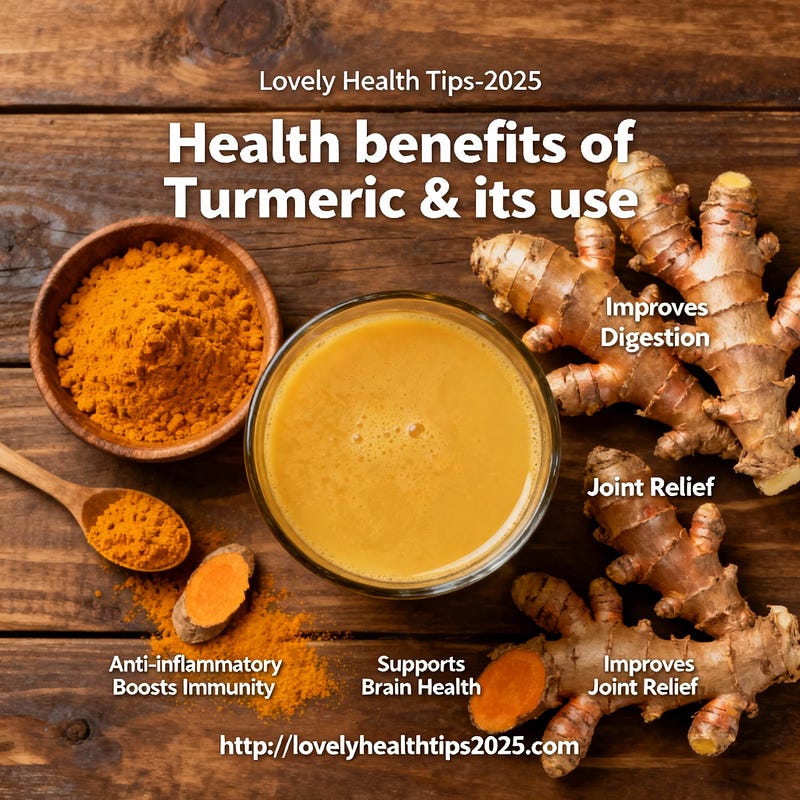Last Updated on October 21, 2025 by
The spice of health, medicine and life – Health benefits of Turmeric
Introduction:
The so-called gold spice Turmeric is a traditional medicine ingredient in Ayurveda (a thousand year old Indian) and also a Traditional Chinese Medicine. Today, being its vivid yellow-golden colour and natural flavour, turmeric has been both the household staple of any cook worldwide and the natural medicine with immense health-promoting properties. Modern science has recently shown intense interest in the use of turmeric and its active constituent curcumin as a medicine. In this blog, it will discuss the history of turmeric, health benefit, cooking, research and recent research and its application in the daily health routine.
History and origin of Turmeric
The Turmeric (Curcuma longa) is also a flowering plant and belongs to the ginger family. Its root or rhizome is most widely used as a spice, medicine and dye. Turmeric is a product native to South Asia and has been used over 4 millennia.
- Turmeric was also used in Ayurveda medicine in India, where it was used for digestive disorders, respiratory system disorders, wound treatment and purifying the blood.
- Traditional Chinese Medicine saw its application in liver issues, menstrual disorders, chest pain and inflammations.
- Turmeric was spread to different trade routes around the world, it was used in the cuisines of Southeast Asia, the Middle East and Africa.
It is based on this rich history of application that turmeric deserves attention as food, as an aiding and protective herb.
You may visit to my previous website for Turmeric use – Best 10 Functional Food Benefits.
Nutritional Composition
Turmeric is a spice that can be used as a flavoring agent as well as a source of nutrients. It is a relatively low-consumption, yet it has bioactive plant compounds, which will ensure that you are healthy.
The main ingredients discussed as follows:
- Curcumin: It is the active ingredient that is known to give it an antioxidant and anti-inflammatory effect.
- Volunteer oils: These include turmerone and zingiberene which also help in its medicinal properties.
- Vitamins and minerals: Low vitamin C, vitamin B 6, iron, manganese and potassium.
Curcumin may be a low bioavailable product that which means the body can’t absorb it well. But when combined with black pepper (piperine contained), it is possible to boost the absorption of curcumin to 200%.
Health Benefits of Turmeric
1. Strong Anti-Inflammatory Action
Low-level and chronic inflammation is associated with heart disease, cancer and other related diseases like arthritis. The curcumin has its action by suppressing most of the inflammatory processes produced by the body, which diminish the formation of inflammatory markers. This assists in reducing the risk or development of inflammatory diseases.

2. Antioxidant Protection
The free radicals destroy cells which lead to aging and chronic disease. Turmeric contains high levels of antioxidants, especially curcumin, that serve as neutralizing free radicals and also enhances the natural enzymes within the body that help to neutralize free radicals.

3. Joint and Arthritis Relief
Turmeric supplementation has been demonstrated to decrease the symptoms of osteoarthritis and rheumatoid arthritis including swelling and stiffness of the joints in many studies. It is also an anti-inflammatory product and a good alternative to people who would consider taking pain drugs in the long term.

4. Mental Illnesses and Psychosomatic Problems.
Furthermore, curcumin may raise brain-derived neurotrophic factor (BDNF), a protein that facilitates the brain neuroplasticity by enhancing the growth of the brain neurons. BDNF levels are low in depression. It has been shown that clinically, turmeric has the potential to positively influence memory, neurodegenerative disease and mood.

5. Heart Health Support
The preventive effect of turmeric is against heart diseases and improves the functioning of endothelium (the lining of blood vessels) and reduces oxidative stress and inflammation. One can use it to test cholesterol and arterial plaque.

6. Psychotherapy Potential: Anti-Cancer.
The initial results of the research show that curcumin can suppress the growth of cancer and stifle the development of tumors in cell cultures. It causes an interference with cellular signal transduction, inflammation and is an antioxidant. Though not a replacement of medical care, it has shown promise as an adjunct to medical care.

7. Liver Health
Traditionally, Turmeric is referred to as a liver detoxifier. It is also scientifically proven to enhance liver functions through the reduction of oxidative stress, as well as by increasing the production of bile. It is able to offer protection against hepatic steatosis.

8. Gut and Digestive Wellness
The ingredient is popular when it comes to skincare because turmeric has anti-inflammatory, antioxidant and antibacterial properties. It may possesses antimicrobial qualities which is able to keep the intestine healthy. Clinical trials are also helpful when it comes to treating irritable bowel syndrome (IBS) and ulcerative colitis.

9. Skin Health and Healing
The ingredient turmeric is popular in the skincare process because it has an anti-inflammatory, antibacterial and antioxidant attribute. It aids in curing acne, lightening the skin as well as hastening heals. Turmeric face mask is an ancient South Asian beauty tradition.

10. Immune System Boost
Curcumin enhances the immune system by balancing the functions of immune cells and persistent inflammation. This boosts resistance against infection in the body.

Culinary Uses of Turmeric
Turmeric is an excellent food additive, which provides food with a tangy flavor and a nutritious touch:
- Curries and stews: This is the most passionate and homeliest flavor of Indian curries and lentils.
- Golden milk (haldi doodh): Turmeric, milk, black pepper and honey are combined in a mixture that is typically consumed to improve immunity and unwind.
- Smoothies and teas: Turmeric powder may be taken in small portions as a smoothie and also as a herbal tea.
- Rice and grains: Turmeric is a spice that can be added in form of pinch to rice to give it a golden colour and light taste.
- Soups : Improves the taste & nutrition.
- Baked products: Turmeric may be used to give natural tint and distinct aroma to such products as bread, muffins and energy bites.

Current Research and Evidence.
On-going clinical trials involve the use of turmeric in the treatment of chronic diseases. Its ability to treat inflammation and oxidative damage is demonstrated in scientific reviews, but scientists stress that dietary turmeric is not as helpful as supplements with curcumin due to the concentration and absorption issues.
Other possible lines of research are:
- Curcumin adjunct cancer therapy.
- Typical procedures in alleviating depressive symptoms and anxiety.
- Research of metabolic condition, such as weight management, type 2 diabetes, insulin resistance.
Nevertheless, researchers warn that turmeric should not be taken as a mono-therapy even with its immense healing powers. The end results are the same whether it is lifestyle, food or health care.
How to Take Turmeric
The daily dose is not predetermined but as a rule, it is:
- Fresh turmeric root: 1.5 to 3 grams a day.
- Dried powder: 400 -600 mg three times a day or less.
Tips:
- You should always use turmeric with black pepper as well as a fatty substance (coconut oil, ghee or olive oil) to absorb it better.
- Start with low amount when taking turmeric especially as supplements because higher amounts cause stomach upset.
- Never take any form of supplement without consulting your health care provider especially when you are pregnant, breastfeeding or on any kind of medication like blood thinning medication.
Side Effects and Precautions
Turmeric is believed to be safe when taken in food, but when taken in large doses, the supplement may cause issues with some individuals:
- Intestinal problem, nausea or may cause diarrhoea.
- The risk of hematuria in combination with anticoagulants.
- Possible to reduce blood sugar, diabetics using the drug should be cautious.
- May is apparently responsive to issues with the gallbladder or kidney stones since it contains oxalate.
Home Remedies and Wellness
Home remedies- Turmeric is still used in home remedies:
- What cures the cold and the cough: Golden milk soothes the throat and boosts immunity.
- Wounds and cuts: Turmeric is a substance that is topically applied in the form of a paste to prevent infection and speed up healing.
- To attain the glowing look of the skins: Turmeric face mask (mixed with honey or yogurt) provide the skin with an effect of natural lightening.
- To help in the digestion process: Turmeric water or tea is boiled and helps relieve bloating and works on the health of the gut.

Beauty industry
It is a known fact that turmeric has been utilized in the beauty industry since ancient times.
The natural anti-inflammatory and antioxidant properties of Turmeric have brought it to the prestigious position of skincare ingredient. It is now available in face creams, masks, soaps, scrubs and lotions that remove acne, dark spots and dull skin. It is the skincare that has gained popularity all over the world as it brightens the skin.

Concluding Points:
Turmeric is literally a gift of nature with regards to its health and culinary value. It is a well-tested healing spice and it has been used in thousands of years and has powerful immunizing, inflammatory, brain and prevention of chronic diseases effects that are still being verified by contemporary science. It is a small but powerful step to a healthier life by beginning your day with turmeric in your food, tea, cosmetics or supplements and so on.
Turmeric, due to its many benefits and its curative qualities, is still the best spice you can use in your health path.

Reference from Harvard Health: Turmeric benefits: A look at the evidence — Harvard Health
Thanks and Regards.
Thanks and Regards.
About the Author – “Mr. Bibhu Ranjan Mund”, Master in Public Health (MPH) from IIHMR University, Jaipur (Rajasthan) has experience of 18 years in Public Health activities. Through “Lovely Health Tips-2025”, we share the evidence & experienced based health & wellness guides with solutions for every day well-being. More from Author
Disclaimer
This information is suggestive only and not a replacement for medical advice. For more detail, please visit to my website as mentioned below:

